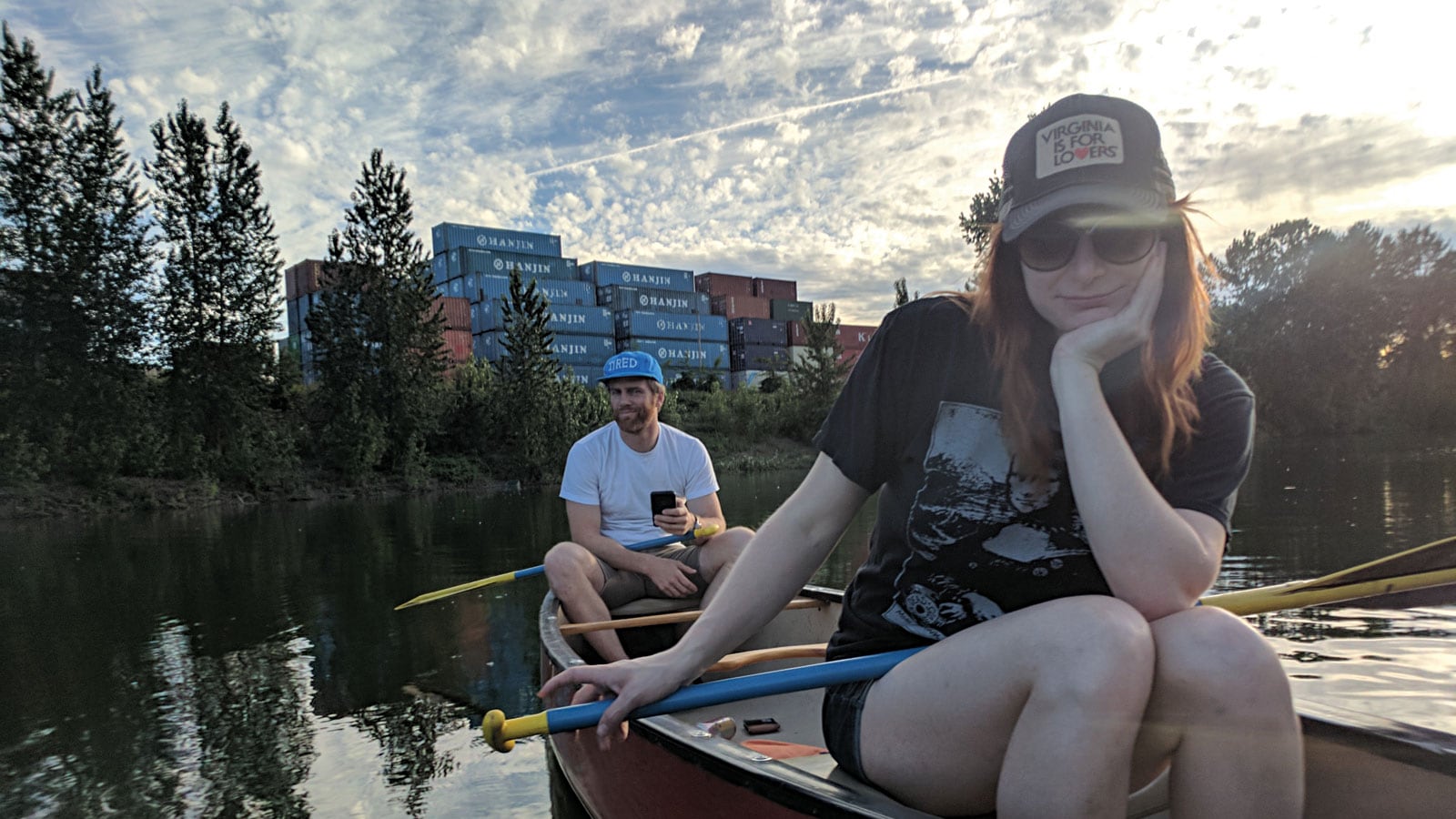Something was very wrong with the duck.
The bird was careening loudly back and forth across the smear of algae-green water, looking as if it had clipped a wing or just gone insane. But eventually it seemed to reach a terrifying decision: It was going to destroy me. Wings wildly flapping, it raised its breast above the fetid waves and ran at me like an angry prophet across the tops of the waters.
If you're ever going to fight a duck in Portland, the Columbia Slough is where it'll happen. Even the birds are somehow corrupted by this place, I thought.
Unknown even to most Portland natives, the narrow 19-mile channel is a Southern gothic wetlands bending lazily through the city's northern industrial wastes, from Fairview Lake to St. Johns. Running parallel to the Columbia River, the slough, pronounced "sloo," is less a stream than a marathon-length mud puddle: Its shallow, viscous water moves so slowly the current heaves back and forth with the tides. Every few years a body is found amid the lily pads.

The slough is Portland's bad breath, our petri-dish Everglades, a hidden place teeming with birds and fish and hobo pirates, and pocked with sudden, startling beauty.
Needless to say, I am obsessed with it.
And though there are guided tours available for a few of its more savory sections, I decided, perhaps stupidly, that I should paddle a more forbidding leg.


I am not a kayaker. My friend and I had borrowed boats with great, bounding optimism, but before I'd even gotten off the launch site, located at a park devoted to solar panels at Northeast 165th Avenue and Airport Way—down a little dirt path where three teenagers regarded us suspiciously while smoking under an overpass—I went ass over teakettle while still heaving off the dock, and fell shoulder-deep into the brine.
It was like entering a sink drain, except somehow much worse. I rose back up like a lagoon monster, covered in thick algal strands and smelling like a rain-forest corpse. On the dock, I watched my phone flicker to garbled life for one last time, then die forever.
I had entered the darkest heart of Portland. There was no turning back.
And yet less than a mile later, while sliding through water so thick with plant life that the boat made a light shushing noise from friction as it passed through, here's this deranged duck coming at me with my pants still wet.
I raised up the paddle protectively in front of me: Would I be a terrible person if I fucked up a duck?
I didn't have to find out. Maybe 20 feet away, the bird suddenly kicked back a graceful 180 and launched itself into the air before landing 100 yards downstream, where we saw tiny shapes moving in the water.
I finally understood: This duck was not insane. She was a mother. While I worried about her frantic movements, her flightless ducklings had paddled safely away.
I felt myself suddenly an intruder, in a narrow smear of nature that was still quite wild.
The slough is desperate with life. Raptors sit solitary watch in the trees, the water ripples with water-skippers and at times near-boils from the Chinook, peamouths, crappies and—I hoped—steelhead swimming beneath.
Again and again, we passed nesting clusters of blue-fronted kingfisher, heavy-winged and galumphing great blue herons, and a lone great egret whose whomping flight seemed a miracle—evidence the laws of nature have a strange sense of humor. A nuclear family of geese, 10 deep with goslings that massed together into a hydra-headed Chia Pet, eyed us with silent and violent dares. You can forget you're even in the city until you look up to see a familiar word behind the trees: "COSTCO."


But after such peace, disaster struck again. We'd gone perhaps 2 miles before discovering a great roaring nothing, a pile of pond scum and a wall of grass. It was the great levee of 143rd Avenue, located by some kind of office park. This required portage—a fancy boating term for carrying your ass and your boat out of the water, in this case lugging it over a 30-foot hill like Klaus Kinski in Fitzcarraldo, mud and river water drying into cake on our ankles.
At Northeast 120th Avenue, after passing under a 122nd Avenue overpass that smelled strongly and sweetly of coffee, again we had a portage—this time a massive sewer pipe, requiring us to haul ourselves over dead blackberry bushes with ropes someone had helpfully strung over the pipe.


By the time we again settled ourselves into the rhythms of nature, where each turn of the river was a sudden, sun-dappled vista, with raccoons creeping in and out of the brush line, more and more pieces of humanity began to creep in like low drumbeats: a tarpaulin tent above the top of the shoreline, a full package of Bob's Red Mill Steel Cut Oats floating unmolested in the water, spare tires, an orange juice container. This was pirate country—Slough Town, at the edge of Parkrose.
Related: How One Portland Neighborhood Learned to Stop Worrying and Love the Homeless
But Slough Town, at least this day, was much diminished: Though a small tent village loomed overhead, at the level of the water there was just one occupied houseboat lifted on barrels next to a dock loaded with bicycles. Within, as we looked back, a shirtless man with a beard, red scalp and massive back sat scrubbing his clothes with a brush. We recognized him as a man named Gilligan—we'd heard of him. We waved, and he didn't wave back.


Just downstream, a shipwreck of a former houseboat had sprawled across the slough, blocking the current so badly that an inch-thick cake of sun-dried algae had formed itself into a slime cap the texture of turds that repelled all paddling or forward motion. It was the slough of the slough—a shit-smelling pile of human rubbish trapped like pear chunks in gelatin. One had to break the surface with the oar, fighting not to let the algae slip up the paddle and down one's armpit, which also nonetheless happened.
We don't know what disaster had befallen the houseboat, but by the time we passed under the I-205 freeway—and yet another logjam of hard-capped algae—we were smelly, tired and slightly ruined, even as freeway noise gave way within minutes to one of the most beautiful 10 blocks of water leading to the long, dark, echoing culvert beneath 82nd Avenue.
Finally, after 5 miles of dankness, we pulled out at a set of concrete stairs at the corner of Northeast Alderwood and Cornfoot roads, where the massive U.S. Postal Service building loomed against the sky. Still stinking from the water, triumphant, we cracked a pair of Stiegls that had somehow made it through unscathed.

Portland Has Been Damp All Year, Now Let's Get Wet
Rooster Rock is a Big, Nude, Queer-friendly Swamp Thanks to The Wet Winter
Everything You Needed to Know About Portland's Hottest Summer Hangout, The Dock
The Five Best Hot Springs in Western Oregon
We Kayaked Down 5 Miles of North Portland's Secret Everglades
We Bar-Crawled the Willamette River By Boat
The Pacific Northwest Finally Has a Bougie Surf Hotel
Meet the Heroes Suing to Free Oswego Lake, the Portland Area's Forbidden Paradise

